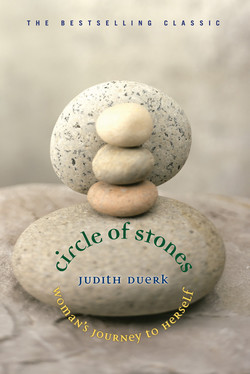Читать книгу Circle of Stones - Judith Duerk - Страница 14
На сайте Литреса книга снята с продажи.
ОглавлениеThe universal importance of woman’s tears
I am at a conference leading a small group, as I have done many times in waking life. After it is over, one woman, Pat Fleming, speaks with me about the book used for the group, a history of the Elamites, of “how it was before the patriarchal period.” I tell her, “It was during that earlier time that something important was allowed …” and she says softly, “Yes, sadness.”
Then I say good-bye and leave the conference. (And, in fact, shortly before the dream occurred, I had painfully decided that I must leave a conference which had been an important part of my life for more than ten years.) I kiss Sarah, now ninety years old, on the cheek, and kneel down to gather up my books and records. Someone asks, “Do you notice that each time she says good-bye she kneels down to hide her face so her sadness won’t be seen?”
The last scene is in my consultation room. I am in session with a young woman of Middle Eastern heritage, whose father was not only strongly oppressive but used a framework of Freudian psychology and actual accusations of “penis envy” to subdue his daughter. She had struggled, in her work and growth, to reclaim her fine intellect and rational thinking to aid her to fulfill herself as a woman: to have that fine rational thinking function serve her feeling values, rather than to have it dominate them and force her to live out her life either as a power-driven “son” for her father or as a piece of fluff. At the time of the dream, she was in law school and about to be engaged to the man she loved—one whom her father had disapproved.
In the dream setting, the young woman is sitting in the chair across from me. Standing slightly behind her, in the shadows, is her Middle Eastern grandfather, in his native costume. The air around him is crackling with traditional patriarchal tribal laws, taboos, and mores. It is clear that if he had had his way, neither his granddaughter nor I would be there, certainly not sitting quietly and conferring about her life and how she intended to live it—claiming her own right to direct it.
The young woman sits and quietly begins to cry.
The grandfather criticizes her tears.
Something of being present in the same room with the two polarities—the young, emerging, feminine feeling side and the old, negating, oppressing, disapproving patriarchal side—fires my passion and crystallizes my words.
“No!” I say.
“No, she must be allowed to cry. It is only when woman can experience her tears in the moment that she can also experience her true, deep feeling values in the moment. The tears of these young and capable women must be allowed and encouraged to flow—to flow out to the culture and society which so truly and desperately need them and their tears—to help society reconnect with the true and deep values of life which can sustain and support that culture, that life, that of life in their society,
“Someday, when the first woman president of the United States holds the sides of the podium and says ‘My fellow Americans …’ as she is inaugurated, it will be important that she can be there, weeping, as she speaks, and that her tears and the intensity with which she is in touch with her feeling values can flow out to and nourish the society and influence all women.”
When I awoke from the dream, I was amazed at the flow of words and at their passion. It was clear that they had flowed out of my own deepest feeling values—those that I fervently believed in and cared most deeply about.
I was especially touched by the podium scene—as the words “my fellow Americans” were delivered, I had gripped the sides of the lap desk my husband had made for me … as if the expression of those deep feeling values from the feminine took place on a platform carefully prepared by the supportive masculine. The dream had reminded me how helpful it is if a woman has support either from an outer man or her own inner masculine side as she brings out her feeling values,
For clearly the values of the feminine need to come forth … of the earth, the instincts, the individual … all that nurtures and sustains life. Those values need to come forth, to re-emerge with their ancient feminine strength and passion. Those values need to come forth and to voice … this time, not to be silenced by the oppressing, negating ancient patriarchy, but to speak clearly and firmly from the even more ancient flow of the Archetypal Feminine.
How might your life have been different if there had been a place for you? A place for you to go … a place of women, to help you learn the ways of woman … a place where you were nurtured from an ancient flow sustaining you and steadying you as you sought to become yourself. A place of women to help you find and trust the ancient flow already there within yourself … waiting to be released …
A place of women …
How might your life be different?
